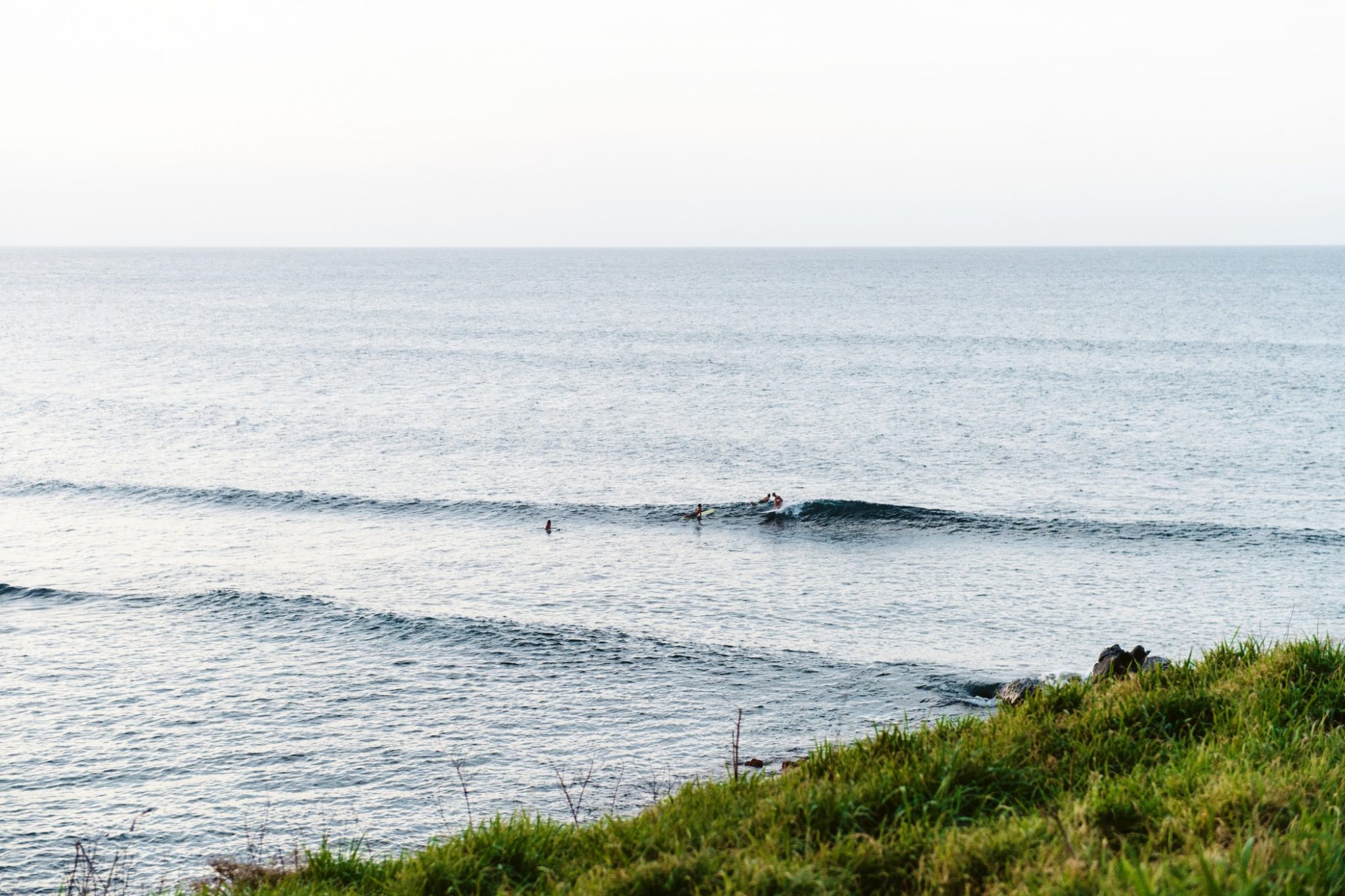Go ahead and add these places to your must-see list while visiting the Valley Isle. They may be small in size, but each of these towns has larger-than-life personalities. Kahakuloa Village takes you off the beaten path; Pa‘ia Town compels you to slow down and relax; Makawao Town radiates with rustic ambience; and Wailuku Town reveals what makes Maui tick. Maui’s sleepy little towns may differ geographically and otherwise, but there’s one thing they each have in common: a warm and welcoming atmosphere for the LGBT traveler.
Text by Sarah Ruppenthal
Images by John Hook
Kahakuloa Village
It’s a blink-or-you’ll-miss-it town, but with its abundance of scenic beauty, Kahakuloa Village is worth a long look. A scenic drive (be sure to fuel up before you go, as there are no gas stations in Kahakuloa) along Maui’s west coast on the Kahekili Highway—past the Nakalele Blowhole and Olivine Pools—will deliver you here, one of the most remote places on the island.
Be forewarned, the road to Kahakuloa (which means “tall lord”) is slow going, with a harrowing series of one-lane bridges and cliff-hugging hairpin turns. But the destination is well worth the journey. Home to around 100 residents, this sleepy fishing village embraces a slower pace of life. Outside of a few churches, art galleries, and gift shops, there’s not a whole lot of activity; there are no restaurants, bars, or cafés. Instead, you will find roadside stands offering fresh fruit, cold drinks, and banana bread, including Ululani’s by the Bay, a snack cart operated by Ululani Ho‘opi‘i, wife of Hawaiian music legend Richard Ho‘opi‘i of the Ho‘opi‘i Brothers. Perched atop west Maui’s high sea cliffs, Kahakuloa has sweeping, unobstructed views of the Pacific Ocean. Visitors may be smitten with its dramatic landscapes, but its local residents cherish the enduring character and culture embedded in this close-knit community.
Pa‘ia Town

A shop along Baldwin Avenue in Pa‘ia, a bustling stretch for shopping and dining.
Once a thriving plantation village, this hippie surfer enclave is quaint, historic, and overflowing with small-town charm. Nestled on Maui’s north shore on the road to Hana, Pa‘ia Town has long been a hotspot for surfers and free spirits alike. There’s an ever-present laid-back—and at times, quirky—vibe here; it’s not uncommon to see residents strolling around barefoot, carrying a surfboard or strumming an ‘ukulele. Just a stone’s throw from the beach, Pa‘ia may be most known for its proximity to some of the best waves on the planet: A few miles away is Ho‘okipa Beach Park, dubbed the “windsurfing capital of the world,” and just a bit farther down the road is Jaws, the surf spot appropriately named for the colossal waves that draw daredevil big wave surfers for a thrill ride of a lifetime.
Surfing and alternative lifestyles draw an eclectic array of residents to Pa‘ia Town.
The town also offers a colorful mosaic of art galleries, cafés, yoga studios, salons, and tattoo parlors. When it comes to dining, there is no shortage of options, but the local pizza joint, Flatbread Company, is a perennial crowd favorite (be prepared to wait for a table, especially at happy hour or dinnertime). Mana Foods, the town’s health food store, is also a mainstay for locals and visitors alike. You won’t find any swanky resorts here, but Paia Inn offers rooms smack dab in the middle of town, and there are a handful of charming bed and breakfasts, youth hostels, and private vacation rentals on the outskirts. On any given night, you can get an earful of live music at Charley’s Restaurant & Saloon—and there’s a chance you might see some familiar faces on stage (country music legend Willie Nelson is a Charley’s regular).
Makawao Town
A horse grazing outside Makawao Town, which is home base for the ranching community on Maui.
Makawao Town puts the country in upcountry Maui. Rustic and unmistakably charming, Maui’s paniolo (cowboy) town is a drastic departure from the glitzier, fun-under-the-sun vibe of the island’s beachfront resorts. There are, in fact, no hotels or resorts—or beaches, for that matter. Here, instead, you will find a vibrant mix of art galleries, boutiques, and eateries. Steeped in history, Makawao is a portal to Maui’s past: In the 19th century, Portuguese settlers taught Hawaiians living in the area how to ranch. It’s safe to say the lessons paid off. The country-western theme extends past the arena and nearby horse pastures. You’ll find rodeo paraphernalia just about everywhere, and there are hitching posts scattered throughout the town. There’s even a good chance you’ll see a cowboy or cowgirl moseying down the street on horseback.
When it comes to dining options, Makawao has just about every food genre covered. Polli’s Mexican Restaurant, Casanova Italian Restaurant & Deli (which leads a double life as the town’s only nightclub), and Makawao Steak House are longstanding favorites. If you’re looking to indulge your sweet tooth, Komoda Store & Bakery is a must-try—it’s a guarantee you won’t leave hungry or empty-handed.
Wailuku Town
Request Music in Wailuku.
Wailuku Town is best known as the county seat of Maui. It’s just about the only place on the island where locals don’t gawk at men and women wearing business suits and carrying briefcases. But outside of the government offices and law firms that line the streets of Wailuku, there are thriving music, theater, and cultural scenes that evoke a familiar feeling of nostalgia. The town is home to several cultural and historic sites, including Ka‘ahumanu Church and clock tower, Bailey House Museum, and the historic ‘Iao Theater, which has hosted live theater productions since it opened in 1928.

The chicken katsu at Ichiban Okazuya is another great reason to go off the beaten path.
Accordingly, in the early 1900s, Wailuku was one of Maui’s most popular tourist destinations. Over the years, though, the town’s appeal was eclipsed by the allure of sun-drenched venues like Wailea and Ka‘anapali resorts. But Wailuku hasn’t lost its mojo entirely. In addition to an air of authenticity, Wailuku may very well be the proverbial diamond in the rough. You’ll find an assortment of rare treasures and local art within the town’s wooden storefronts, and there is also a tantalizing selection of restaurants, delis, bakeries, and coffee shops serving up inexpensive fare ranging from spicy Thai cuisine to the ever-popular plate lunch. Including the island’s one and only record store, Wailuku’s eclectic blend of family-owned and -operated restaurants, cafés, and shops shows what it’s really like to live on Maui.




